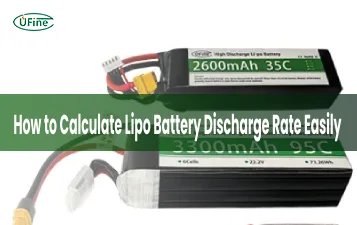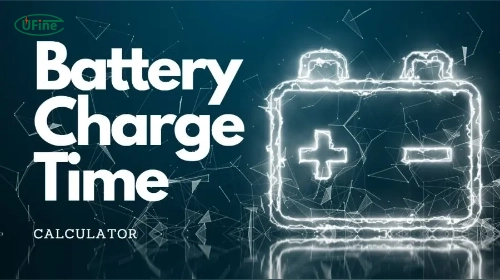Calculating battery charge time is crucial for extending battery life, ensuring device safety, and optimizing charging efficiency. Whether you’re using a LiPo battery for your drone or a Li-ion battery for daily electronics, understanding the charge rate and time prevents overcharging, overheating, and potential damage.
Part 1. What is the LiPo charge rate calculator?
The LiPo Battery Charge Rate Calculator is a tool designed to compute the safe charging rate for Lithium Polymer batteries. It considers various battery and charging specifications to provide an optimal charging rate.
Part 2. How to use the LiPo charge rate battery calculator?
When using a lithium battery charge time calculator, accuracy is key. Be sure to input correct specifications such as voltage, capacity, and charge rate.
- 1. Steps to Use the Calculator:
Battery Type Selection: Choose the lithium battery you intend to charge. Standard selections include LiPo (Lithium Polymer), Li-ion (Lithium-ion), and LiFePO4 (Lithium Iron Phosphate), among others. Each type might have different charging characteristics; the calculator accounts for these differences.
- 2. Battery Specifications Input:
Input the specific battery specifications as accurately as possible. This includes the battery’s nominal voltage (V), capacity measured in milliampere-hours (mAh), and, if available, the maximum charge rate recommended by the battery manufacturer.
For instance:
LiPo Battery: Nominal voltage of 3.7V, 2200mAh capacity, maximum charge rate of 2C.
Li-ion Battery: Nominal voltage of 3.6V, 3000mAh capacity, maximum charge rate of 1C.
LiFePO4 Battery: Nominal voltage of 3.3V, 1500mAh capacity, maximum charge rate of 0.5C.
- 3. Charger Specifications Input:
Enter the specifications of the charger you intend to use. This includes the charger’s maximum charge current output (in amperes or milliamperes).
For instance:
If using a LiPo battery charger with a maximum charge output of 1.5A, input this value into the calculator.
- 4.Calculation:
Once all required information is entered, the calculator will process the data and compute the recommended charging rate. It will provide the appropriate charge rate for your specific battery, ensuring safe and optimal charging.
- 5. Review and Adjustment:
Check the calculated charge rate against the manufacturer’s recommendations or industry standards for safety. If the estimated rate exceeds the manufacturer’s maximum recommended charge rate, consider adjusting the charger settings to align with the manufacturer’s guidelines.
Common Mistakes When Calculating Battery Charge Time
While calculating battery charge time may seem straightforward, there are some common mistakes to avoid:
- Ignoring Charging Efficiency: Many users overlook that not all energy is effectively transferred, leading to inaccurate charge time estimations.
- Using Incorrect Specifications: Ensure that the input data for the battery and charger matches the manufacturer’s guidelines.
- Overlooking Safety Factors: Always incorporate a safety buffer in the calculation to prevent overcharging.
Tip: Use reliable calculators or tools that improve efficiency and provide safe recommendations.
Part 3. Battery charging time calculation formulas
Calculating the charging time for a battery involves considering its capacity, charge rate, and specific formulas to estimate the time required for a full charge. The charging time depends on the battery’s capacity and the charging current applied.
Formula 1: Charging Time = Battery Capacity / Charging Current
This basic formula estimates the time needed to charge a battery based on its capacity and the charging current applied.
For example, for a 2000mAh battery charged at 1000mA (1A), the calculation would be 2000mAh / 1000mA = 2 hours.
Formula 2: Charging Time = (Battery Capacity / Charging Efficiency) / Charging Current
This formula considers the charging efficiency, as not all the current supplied during charging goes into the battery due to losses.
For instance, a 3000mAh battery charged at 1A with an 85% charging efficiency would take approximately ((3000mAh / 0.85) / 1000mA) = 3.53 hours.
Formula 3: Charging Time = (Battery Capacity / Charger Output) × 1.5
Often used as a rule of thumb, this formula includes a safety factor (1.5) to prevent overcharging and extend battery longevity.
For a 2500mAh battery charged by a 2A charger, the estimated time would be ((2500mAh / 2000mA) × 1.5) = 1.875 hours.
Examples:
LiPo Battery (2000mAh, 1A Charger):
- a: 2000mAh / 1000mA = 2 hours.
- b: ((2000mAh / 0.85) / 1000mA) = 2.35 hours.
- c: ((2000mAh / 1000mA) × 1.5) = 3 hours.
Li-ion Battery (3000mAh, 2A Charger):
- a: 3000mAh / 2000mA = 1.5 hours.
- b: ((3000mAh / 0.85) / 2000mA) = 1.76 hours.
- c: ((3000mAh / 2000mA) × 1.5) = 2.25 hours.
LiFePO4 Battery (1500mAh, 500mA Charger):
- a: 1500mAh / 500mA = 3 hours.
- b: ((1500mAh / 0.85) / 500mA) = 3.53 hours.
- c: ((1500mAh / 500mA) × 1.5) = 4.5 hours.
By utilizing these formulas and understanding the battery’s capacity, charging current, and efficiency, one can accurately estimate the time required to charge various lithium batteries for safe and efficient charging.
Battery Capacity Unit Conversions:
1.mAh to Ah (Milliampere-Hours to Ampere-Hours):
- Conversion Formula: Battery Capacity (Ah) = Battery Capacity (mAh) / 1000
- For example, a 3000mAh battery is equivalent to 3 Ah (3000mAh / 1000).
2.Coulombs to Ampere-Hours:
- Conversion Formula: Battery Capacity (Ah) = Battery Capacity (Coulombs) / 3600
- For example, 7200 Coulombs equals 2 Ah (7200 / 3600).
3. Watt-Hours to Ampere-Hours (for voltage-dependent batteries):
- Conversion Formula: Battery Capacity (Ah) = Battery Capacity (Wh) / Voltage
- Example: For a 12V battery, 36 Watt-hours equals 3 Ah (36 Wh / 12V).
Battery Charge Rate Unit Conversions:
1. Battery Amps to Milliamps:
- Conversion Formula: Charging Current (mA) = Charging Current (A) * 1000
- Example: 2A charging current equals 2000mA (2 * 1000).
2. Battery C-rate to Amps:
- Conversion Formula: Charging Current (A) = Battery Capacity (Ah) * C-rate
- Example: For a 5Ah battery at 0.5C, the charging current is 2.5A (5Ah * 0.5).
3. Battery Watts to Amps (for constant voltage charging):
- Conversion Formula: Charging Current (A) = Charging Power (W) / Charging Voltage
- Example: For 30W charging power at 5V, the charging current is 6A (30W / 5V).
4. Battery Coulombs to Amps:
- Conversion Formula: Charging Current (A) = Charge (Coulombs) / Charging Time (Seconds)
- Example: 7200 Coulombs charged in 1800 seconds equals 4A (7200 / 1800).
Example Comparison of Charging Times for Different Batteries
| Battery Type | Capacity (mAh) | Charger Output (A) | Efficiency (%) | Estimated Charge Time (Hours) |
|---|---|---|---|---|
| LiPo | 2000 | 1.0 | 85 | 2.35 |
| Li-ion | 3000 | 2.0 | 90 | 1.67 |
| LiFePO4 | 1500 | 0.5 | 80 | 3.75 |
Discover Expert Tips for Battery Charging Safety and Longevity!
Explore our blog for in-depth guides and insights on safe LiPo, Li-ion, and LiFePO4 battery charging. Learn how to maximize efficiency and battery lifespan today.
Part 4. FAQs
-
At what rate should I charge my LiPo battery?
The charge rate for LiPo batteries is often recommended between 1C and 5C, meaning one to five times the battery’s capacity. Higher rates can charge faster but may impact battery lifespan and safety. -
How do you calculate the charge rate of a LiPo battery?
To calculate the charge rate, divide the battery’s capacity (in ampere-hours, Ah) by the chosen charge rate. For instance, a 2000mAh battery charged at 1C would have a charge rate of 2A. -
What happens if I exceed the recommended charging rate?
Exceeding the recommended rate may cause overheating, reduced battery lifespan, or even safety hazards like fire or explosion. -
Can I use the calculator for all lithium batteries?
Yes, the calculator supports LiPo, Li-ion, and LiFePO4 batteries, provided you input accurate specifications. -
How does charging efficiency impact battery charge time?
Charging efficiency accounts for energy losses during the process, typically around 80-90% for lithium batteries. Always factor this in for accurate results. -
Should I charge the LiPo battery to 100%?
Charging a LiPo battery to 100% is possible but may slightly reduce its lifespan. Some users prefer charging LiPo batteries to around 80% for prolonged storage to extend battery health. -
What is a 1C charge rate for a LiPo battery?
A 1C charge rate for a LiPo battery means charging it at a rate equal to its capacity. For example, a 2000mAh battery charged at 1C would have a charge rate of 2A. -
What is the 80% rule for LiPo batteries?
The 80% rule suggests charging LiPo batteries to around 80% of their total capacity for storage purposes, as it’s considered a balance between ensuring a reasonable charge level for usability and reducing stress on the battery for long-term storage.
Related Tags:
More Articles

LiPo Battery Discharge Rate Guide & Calculation Tips
Understand LiPo battery discharge rates, C-ratings, and how to calculate max current. Essential guide for RC, drones, and electronics users.
High‑Capacity 3S LiPo Batteries: 5000 mAh vs. 10000 mAh
Compare 3S LiPo 5000mAh vs 10000mAh batteries by weight, power, and use. Find the best fit for your drone, RC car, or boat setup.
Top 5 Applications for Small 3S LiPo Batteries
Small 3S LiPo batteries power drones, RC gear, wearables, and robotics with high energy and low weight. Making them ideal for compact electronics projects.
Building and Charging Your Own 3S LiPo Pack: A Step‑by‑Step Guide
Learn how to build, balance, and charge a 3S LiPo battery pack safely at home with this complete DIY guide for hobbyists and beginners.
How to Choose the Right LiPo Battery Plug Type?
Discover the best LiPo battery plug types, how to choose them, and expert tips for safe usage, soldering, and maintenance.




